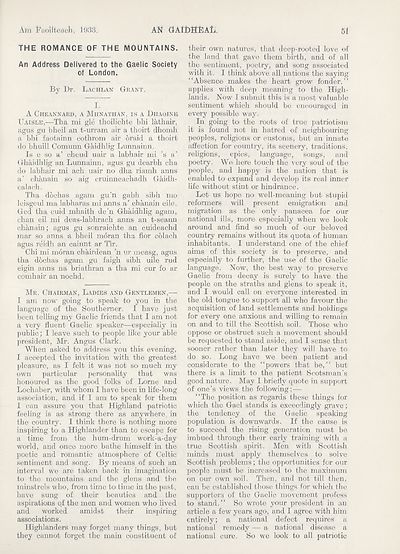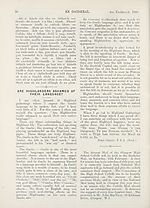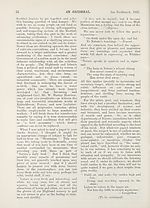An Comunn Gàidhealach Publications > Gaidheal > Volume 28, October 1932--September 1933
(71) Page 51
Download files
Complete book:
Individual page:
Thumbnail gallery: Grid view | List view

Atn faoilteaehj 1933. AN GAlDHtlAL.
THE ROMANCE OF THE MOUNTAINS.
An Address Delivered to the Gaelic Society
of London.
By Dr. Lachlan Grant.
I.
A Cheannard, a Mhnathan, is a Dhaoine
Uaisle,—Tha mi gle thoilichte bhi lathair,
agus gu bheil an t-urram air a thoirt dliomh
a bhi faotainn cothrom air oraid a thoirt
do bhuill Comunn Gkidhlig Lunnainn.
Is e so a’ oheud uair a labhair mi ’s a’
Ghaidhlig an Lunnainn, agus gu dearbh cha
do labhair mi ach uair no dha riamh anns
a’ chanain so aig cruinneachadh Gaidh-
ealach.
Tha dochas agam gu’n gabh sibh mo
leisgeul ma labharas mi anns a’ chanain eile.
Ged tha cuid mhaith de’n Ghaidhlig agam,
chan eil mi deas-labhrach anns an t-seann
chanain; agus gu sonraichte an cuideachd
mar so anns a bheil moran tha fior eolach
agus reidh an cainnt ar Tlr.
Chi mi moran chairdean ’n ur measg, agus
tha dochas agam gu faigh sibh uile rud
eigin anns na briathran a tha mi cur fo ar
comhair an nochd.
Mr. Chairman, Ladies and Gentlemen,—
I am now going to speak to you in the
language of the Southerner. I have just
been telling my Gaelic friends that I am not
a very fluent Gaelic speaker—especially in
public; I leave such to people like your able
president, Mr. Angus Clark.
When asked to address you this evening,
I accepted the invitation with the greatest
pleasure, as I felt it was not so much my
own particular personality that was
honoured as the good folks of Lome and
Lochaber, with whom I have been in life-long
association, and if I ami to speak for them
I can assure you that Highland patriotic
feeling is as strong there as anywhere, in
the country. I think there is nothing more
inspiring to a Highlander than to escape for
a time from the hum-drum work-a-day
world, and once more bathe himself in the
poetic and romantic atmosphere of Celtic
sentiment and song. By means of such an
interval we are taken back in imagination
to the mountains and the glens and the
minstrels who, from time to time in the past,
have sung of their beauties and the
aspirations of the men and women who lived
and worked amidst their inspiring
associations.
Highlanders may forget many things, but
they cannot forget the main constituent of
51
their own natures, that deep-rooted love of
the land that gave them birth, and of all
the sentiment, poetry, and song associated
with it. I think above all nations the saying
“Absence makes the heart grow fonder,’’
applies with deep meaning to the High¬
lands. Now I submit this is a most valuable
sentiment which should be encouraged in
every possible way.
In going to the roots of true patriotism
it is found not in hatred of neighbouring
peoples, religions or customs, but an innate
affection for country, its scenery, traditions,
religions, epics, language, songs, and
poetry. We here touch the very soul of the
people, and happy is the nation that is
enabled to expand and develop its real inner
life without stint or hindrance.
Let us hope no well-meaning but stupid
reformers will present emigration and
migration as the only panacea for our
national ills, more especially when we look
around and find so much of our beloved
country remains without its quota of human
inhabitants. I understand one of the chief
aims of this society is to preserve, and
especially to further, the use of the Gaelic
language. Now, the best way to preserve
Gaelic from decay is surely to have the
people on the straths and glens to speak it,
and I would call on everyone interested in
the old tongue to support all who favour the
acquisition of land settlements and holdings
for every one anxious and willing to remain
on. and to till the Scottish soil. Those who
oppose or obstruct such a movement should
be requested to stand aside, and I sense that
sooner rather than later they will have to
do so. Long have we been patient and
considerate to the “powers that be,’’ but
there is a limit to the patient Scotsman’s
good nature. May I briefly quote in support
of one’s views the following: —
“The position as regards these things for
which the Gael stands is exceedingly grave;
the tendency of the Gaelic speaking
population is downwards. If the cause is
to succeed the rising generation must be
imbued through their early training with a
true Scottish spirit. Men with Scottish
minds must apply themselves to solve
Scottish problems; the opportunities for our
people must be increased to the maximum
on our own soil. Then, and not till then,
can be established those things for which the
supporters of the Gaelic movement profess
to stand.” So wrote your president in an
article a few years ago, and I agree with him
entirely; a national defect requires a
national remedy — a national disease a
national cure. So we look to all patriotic
THE ROMANCE OF THE MOUNTAINS.
An Address Delivered to the Gaelic Society
of London.
By Dr. Lachlan Grant.
I.
A Cheannard, a Mhnathan, is a Dhaoine
Uaisle,—Tha mi gle thoilichte bhi lathair,
agus gu bheil an t-urram air a thoirt dliomh
a bhi faotainn cothrom air oraid a thoirt
do bhuill Comunn Gkidhlig Lunnainn.
Is e so a’ oheud uair a labhair mi ’s a’
Ghaidhlig an Lunnainn, agus gu dearbh cha
do labhair mi ach uair no dha riamh anns
a’ chanain so aig cruinneachadh Gaidh-
ealach.
Tha dochas agam gu’n gabh sibh mo
leisgeul ma labharas mi anns a’ chanain eile.
Ged tha cuid mhaith de’n Ghaidhlig agam,
chan eil mi deas-labhrach anns an t-seann
chanain; agus gu sonraichte an cuideachd
mar so anns a bheil moran tha fior eolach
agus reidh an cainnt ar Tlr.
Chi mi moran chairdean ’n ur measg, agus
tha dochas agam gu faigh sibh uile rud
eigin anns na briathran a tha mi cur fo ar
comhair an nochd.
Mr. Chairman, Ladies and Gentlemen,—
I am now going to speak to you in the
language of the Southerner. I have just
been telling my Gaelic friends that I am not
a very fluent Gaelic speaker—especially in
public; I leave such to people like your able
president, Mr. Angus Clark.
When asked to address you this evening,
I accepted the invitation with the greatest
pleasure, as I felt it was not so much my
own particular personality that was
honoured as the good folks of Lome and
Lochaber, with whom I have been in life-long
association, and if I ami to speak for them
I can assure you that Highland patriotic
feeling is as strong there as anywhere, in
the country. I think there is nothing more
inspiring to a Highlander than to escape for
a time from the hum-drum work-a-day
world, and once more bathe himself in the
poetic and romantic atmosphere of Celtic
sentiment and song. By means of such an
interval we are taken back in imagination
to the mountains and the glens and the
minstrels who, from time to time in the past,
have sung of their beauties and the
aspirations of the men and women who lived
and worked amidst their inspiring
associations.
Highlanders may forget many things, but
they cannot forget the main constituent of
51
their own natures, that deep-rooted love of
the land that gave them birth, and of all
the sentiment, poetry, and song associated
with it. I think above all nations the saying
“Absence makes the heart grow fonder,’’
applies with deep meaning to the High¬
lands. Now I submit this is a most valuable
sentiment which should be encouraged in
every possible way.
In going to the roots of true patriotism
it is found not in hatred of neighbouring
peoples, religions or customs, but an innate
affection for country, its scenery, traditions,
religions, epics, language, songs, and
poetry. We here touch the very soul of the
people, and happy is the nation that is
enabled to expand and develop its real inner
life without stint or hindrance.
Let us hope no well-meaning but stupid
reformers will present emigration and
migration as the only panacea for our
national ills, more especially when we look
around and find so much of our beloved
country remains without its quota of human
inhabitants. I understand one of the chief
aims of this society is to preserve, and
especially to further, the use of the Gaelic
language. Now, the best way to preserve
Gaelic from decay is surely to have the
people on the straths and glens to speak it,
and I would call on everyone interested in
the old tongue to support all who favour the
acquisition of land settlements and holdings
for every one anxious and willing to remain
on. and to till the Scottish soil. Those who
oppose or obstruct such a movement should
be requested to stand aside, and I sense that
sooner rather than later they will have to
do so. Long have we been patient and
considerate to the “powers that be,’’ but
there is a limit to the patient Scotsman’s
good nature. May I briefly quote in support
of one’s views the following: —
“The position as regards these things for
which the Gael stands is exceedingly grave;
the tendency of the Gaelic speaking
population is downwards. If the cause is
to succeed the rising generation must be
imbued through their early training with a
true Scottish spirit. Men with Scottish
minds must apply themselves to solve
Scottish problems; the opportunities for our
people must be increased to the maximum
on our own soil. Then, and not till then,
can be established those things for which the
supporters of the Gaelic movement profess
to stand.” So wrote your president in an
article a few years ago, and I agree with him
entirely; a national defect requires a
national remedy — a national disease a
national cure. So we look to all patriotic
Set display mode to:
![]() Universal Viewer |
Universal Viewer | ![]() Mirador |
Large image | Transcription
Mirador |
Large image | Transcription
| An Comunn Gàidhealach > An Comunn Gàidhealach Publications > Gaidheal > Volume 28, October 1932--September 1933 > (71) Page 51 |
|---|
| Permanent URL | https://digital.nls.uk/127131864 |
|---|
| Description | This contains items published by An Comunn, which are not specifically Mòd-related. It includes journals, annual reports and corporate documents, policy statements, educational resources and published plays and literature. It is arranged alphabetically by title. |
|---|
| Description | A collection of over 400 items published by An Comunn Gàidhealach, the organisation which promotes Gaelic language and culture and organises the Royal National Mòd. Dating from 1891 up to the present day, the collection includes journals and newspapers, annual reports, educational materials, national Mòd programmes, published Mòd literature and music. |
|---|---|
| Additional NLS resources: |
|

